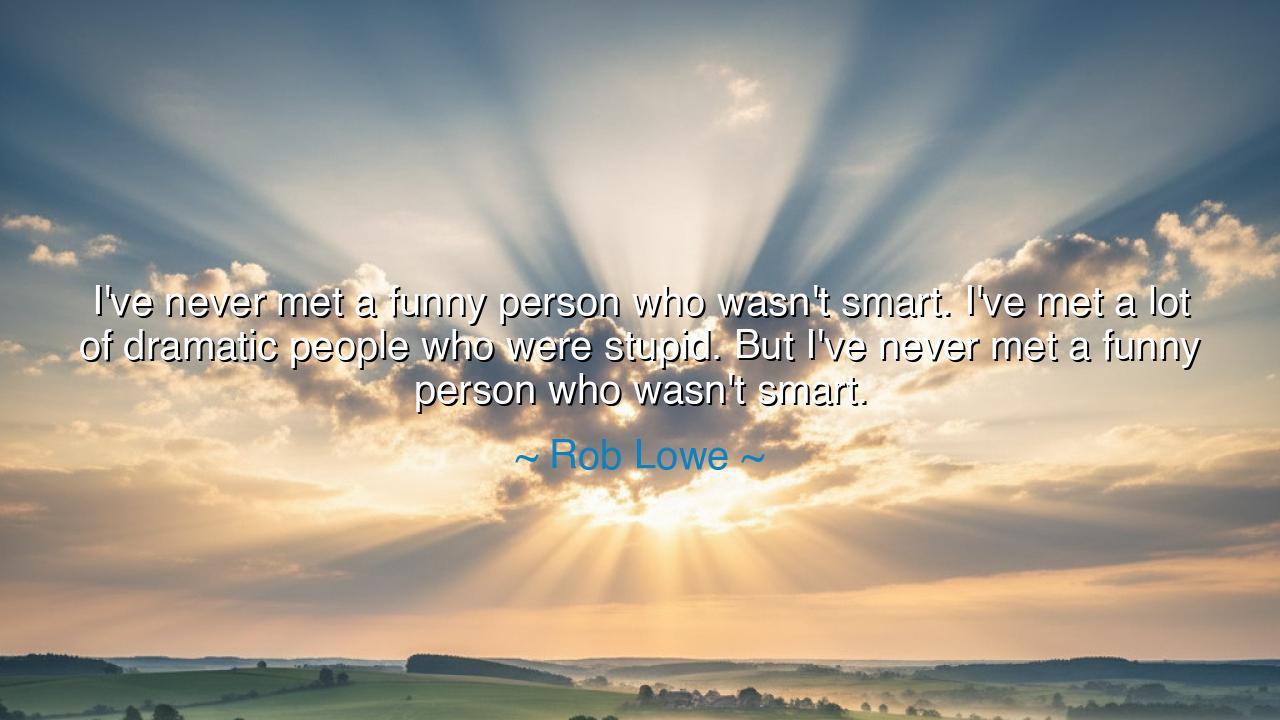
I've never met a funny person who wasn't smart. I've met a lot of
I've never met a funny person who wasn't smart. I've met a lot of dramatic people who were stupid. But I've never met a funny person who wasn't smart.






In the words of Rob Lowe, “I’ve never met a funny person who wasn’t smart. I’ve met a lot of dramatic people who were stupid. But I’ve never met a funny person who wasn’t smart.” — there lives a truth as sharp as the edge of a blade, both cutting and illuminating. What he reveals, in his simple and striking way, is that humor is not a mere accident of personality, nor a childish trick of laughter — it is the fruit of intelligence, born of perception, timing, and understanding. To be truly funny is to see the world as it is — its beauty, its absurdity, its tragedy — and to weave all those threads into something that frees the heart rather than burdens it.
The meaning of this quote lies in the deep relationship between wit and wisdom. The mind that can see humor in life must first be awake — awake to contradiction, to irony, to the delicate balance between joy and sorrow. Humor, when genuine, requires not only intellect, but empathy, for one must understand others to make them laugh. It is not simply the clever arrangement of words, but the art of connection — the recognition that laughter, like light, can guide us through darkness. The fool may jest, but the truly funny are never foolish; they are observers, philosophers of the everyday, teachers in disguise who use laughter to reveal truth.
From the days of the ancients, this truth has echoed through the halls of art and thought. Aristophanes, the great comic playwright of Athens, wielded his humor like a sword and shield. He mocked politicians, philosophers, and gods alike — yet beneath his laughter was a blade of insight. He saw through the pretense of power, the vanity of intellect, and the hypocrisy of the world. His humor was not mere jesting, but wisdom clothed in laughter. The people laughed, but they also learned. Such is the work of the funny and the smart — they make others laugh, not to escape truth, but to face it without fear.
Consider also the wisdom of Mark Twain, who once said, “Against the assault of laughter, nothing can stand.” Twain’s humor was not that of mockery alone, but of deep intelligence — he saw the folly of man and turned it into art. His laughter had the power to dismantle prejudice and pride, to humble kings and comfort slaves. His wit was the flame that lit truth in dark times. Lowe’s words, then, remind us of this lineage — that the funny person is not a fool, but a sage in disguise, one whose laughter carries the weight of understanding.
The origin of Lowe’s reflection may come from his years in the world of performance — a place where both intellect and illusion dwell side by side. In such a world, drama often masks ego, while humor demands humility. The dramatic, as he says, can be stupid — not in intellect, but in self-awareness, blinded by the gravity of their own performance. The funny, by contrast, must remain observant, detached enough to see irony even in their own pain. Comedy demands clarity, and clarity demands intelligence. In this sense, humor is not the enemy of seriousness — it is its refinement.
The lesson, then, is that laughter is a sign of light, and light is born of understanding. To cultivate humor is to cultivate wisdom. Seek to be among the funny and perceptive, not the dramatic and self-absorbed. The one who can laugh at life’s absurdities has conquered despair; the one who can make others laugh has given them strength. Be wary, therefore, of those who mistake gloom for depth — for laughter, when pure, is deeper still. It is a sign of a mind that sees beyond illusion, and of a heart that refuses to be broken by it.
Therefore, my friends, cherish your laughter — not the hollow laughter of mockery, but the joyful laughter born of clarity. Surround yourself with those whose humor reveals, not hides; whose wit uplifts, not wounds. To be funny, as Lowe tells us, is to be alive in the fullest sense — to understand the world and still choose to smile. For while wisdom without humor may become cold, and humor without wisdom may become cruel, the union of the two creates light that warms and endures.
And so, as Rob Lowe’s words remind us, the next time you meet a truly funny soul, look closely — behind their laughter you will find intelligence, compassion, and strength. They are the quiet philosophers of our time, teaching us through joy what others could not teach through sorrow. To be funny and smart is to be both brave and kind — to carry wisdom lightly, and to make the world a little brighter simply by understanding it.






AAdministratorAdministrator
Welcome, honored guests. Please leave a comment, we will respond soon